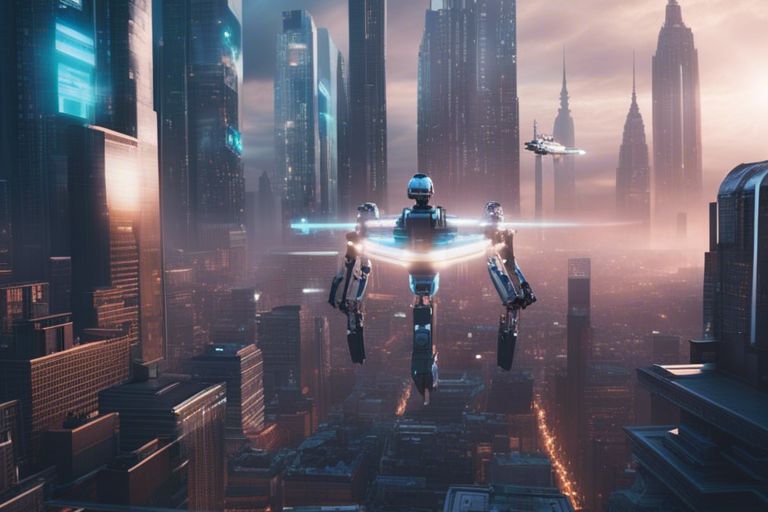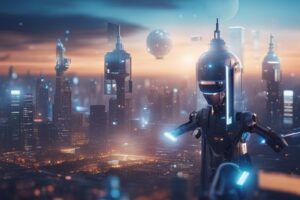Just as AI technology continues to advance at an unprecedented pace, AI-driven imagination is evolving rapidly to redefine creativity, innovation, and possibilities. The integration of artificial intelligence in generating and enhancing human creativity raises exciting prospects but also poses significant challenges and ethical considerations. In this guide, we will probe into the future possibilities of AI-driven imagination, exploring its potential impact on industries, society, and the very essence of human creativity.
Key Takeaways:
- Enhanced Creativity: AI-driven imagination holds the potential to unlock innovative solutions and enhance creative processes across various industries.
- Ethical Considerations: As AI becomes more proficient in generating original content, ethical concerns surrounding intellectual property rights and transparency in AI-generated work will need to be addressed.
- Collaborative Opportunities: The future of AI-driven imagination lies in collaboration between humans and machines, where AI can assist in expanding human creativity and problem-solving capabilities.
Fundamentals of AI-Driven Imagination
How AI Mimics Human Creativity
Clearly, AI-driven imagination has made significant strides in mimicking human creativity. By analyzing vast amounts of data and identifying patterns, AI algorithms can generate original ideas and solutions. While AI may lack human emotions and consciousness, its ability to simulate creative processes is continually improving.
The Role of Neural Networks and Deep Learning
Little by little, AI-driven imagination is reshaping industries and revolutionizing traditional practices. Neural networks, inspired by the human brain, are a key component in AI’s creative capabilities. These networks, combined with deep learning techniques, enable AI to learn from large datasets and generate innovative outputs.
Even so, it is vital to understand that neural networks are only as effective as the data they are trained on. With the potential for biased data to perpetuate harmful stereotypes or misinformation, the ethical considerations in AI-driven creativity must be carefully navigated. Transparency and accountability in the development and deployment of AI systems are crucial to ensuring positive outcomes.

How-to Enhance AI Creativity
Tips for Improving AI Algorithms
Some proven strategies for enhancing AI creativity through improved algorithms include utilizing deep learning techniques, incorporating reinforcement learning methods, and fostering diversity in the training data. To fine-tune AI algorithms, consider implementing techniques such as attention mechanisms, generative adversarial networks, and transfer learning. Experimenting with different hyperparameters and network architectures can also help in enhancing the creativity of the AI system.
- Utilize deep learning techniques
- Incorporate reinforcement learning methods
- Foster diversity in training data
Any enhancements made to the algorithms should be rigorously tested and evaluated to ensure effectiveness and interpretability, maintaining a balance between creativity and utility in the generated outputs.
Factors Influencing AI Creativity
While various factors influence the creativity of AI systems, key elements such as the complexity of the task, the quality of input data, and the level of autonomy granted to the algorithm play a significant role. Factors like the diversity of training examples, the flexibility of the model, and the level of randomness introduced can impact the creative output of an AI system.
- Complexity of the task
- Quality of input data
- Level of autonomy granted
Assume that by carefully balancing these factors and optimizing the AI system’s parameters, one can enhance its creative capabilities while ensuring it functions effectively in diverse scenarios.
More about Factors Influencing AI Creativity
Another critical aspect that influences AI creativity is the extent of domain knowledge embedded in the system, the presence of intrinsic goals or rewards for creative outputs, and the degree of exploration versus exploitation during the learning process. These factors can significantly impact the novelty, usefulness, and adaptability of the AI system’s creative outputs.
- Domain knowledge embedded in the system
- Intrinsic goals or rewards for creative outputs
- Exploration versus exploitation balance
Assume that by optimizing these factors and striking a balance between exploration to generate novel ideas and exploitation to refine and optimize them, AI systems can exhibit truly creative and innovative behaviors.
Applications of AI-Driven Imagination
The Impact on Art and Design
Now, artificial intelligence is revolutionizing the world of art and design by enabling creators to explore new dimensions of creativity. An AI-driven imagination can assist artists in generating innovative ideas, suggesting unique visual concepts, and even creating original pieces of artwork. This technology has the potential to break traditional boundaries and inspire a new wave of artistic expressions.
Transforming Entertainment and Gaming
Assuming a leading role in the future of entertainment and gaming, AI-driven imagination is poised to redefine the way we experience digital content. By leveraging machine learning algorithms and deep neural networks, AI can personalize gaming experiences, predict player behavior, and design interactive storylines that adapt in real-time. Imagination in AI is unlocking a realm of possibilities for immersive and engaging entertainment.
Imagination powered by AI holds the power to bring forth innovative narratives, customized experiences, and interactive worlds that cater to the individual preferences of users. However, there is a need to carefully navigate ethical considerations regarding data privacy, content manipulation, and the potential reinforcement of biased narratives in this evolving landscape.
Ethical Considerations and Future Implications
The Debate Around AI and Intellectual Property
With the proliferation of AI technology in creative fields, there is a growing debate around intellectual property rights. As AI continues to push the boundaries of what is possible in creative endeavors, questions arise about who should own the output generated by these systems. Should it be the original creators who trained the AI, or the AI itself, which generated the work? These complex questions challenge traditional notions of intellectual property and raise concerns about fairness and accountability in a rapidly evolving landscape.
Preparing for an AI-Driven Creative Landscape
Implications of an AI-driven creative landscape are vast and require careful consideration. As AI technology becomes more prevalent in creative processes, it is important for creators, policymakers, and society to anticipate and address the potential impact on job markets, artistic expression, and cultural norms. By proactively addressing these issues, we can harness the power of AI to enhance creativity while mitigating any negative consequences.
Debate around AI and intellectual property is at the forefront of discussions on the future of creativity. The ability of AI to create original works challenges existing copyright laws, raising concerns about ownership and attribution. As AI technology continues to evolve, it is crucial to establish clear guidelines and regulations to protect the rights of creators and ensure fairness in the creative landscape.
Conclusion
Ultimately, the future of AI-driven imagination holds great promise and potential. As technology continues to advance, we can expect AI to play an increasingly instrumental role in creative processes across various industries. From generating innovative ideas to enhancing artistic creations, AI-driven imagination has the capacity to revolutionize the way we approach problem-solving and creativity. It is important that we continue to explore and harness the capabilities of AI to unlock new possibilities and drive advancements in various fields.
FAQ
Q: What does the future hold for AI-driven imagination?
A: The future for AI-driven imagination is promising, with continued advancements in machine learning and artificial intelligence technology. These innovations will likely lead to even more sophisticated and creative AI systems that can generate original ideas, stories, and artistic works.
Q: How will AI-driven imagination impact various industries?
A: AI-driven imagination has the potential to revolutionize multiple industries, such as entertainment, marketing, and design. By leveraging AI-generated content, businesses can streamline creative processes, personalize experiences for consumers, and drive innovation in product development.
What are the ethical implications of AI-driven imagination?
A: As AI-driven imagination becomes more prevalent, ethical considerations must be taken into account. Questions surrounding intellectual property rights, bias in AI-generated content, and the impact on human creativity will need to be addressed to ensure responsible and ethical use of AI in imagination.
